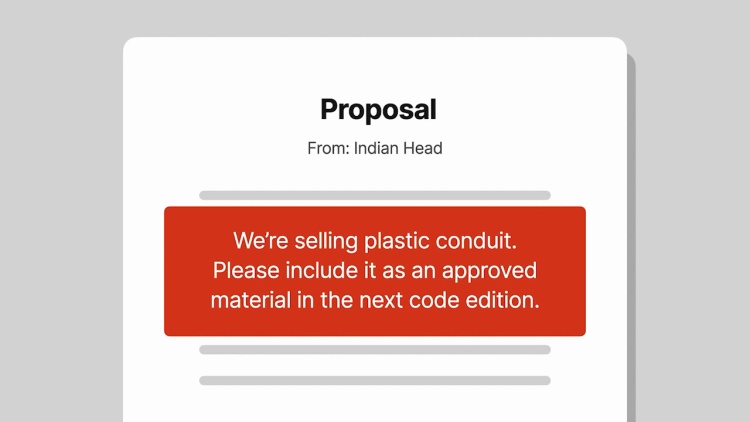Allied Tube & Conduit Corp. v. Indian Head, Inc.
United States Supreme Court
486 U.S. 492 (1998)
- Written by Nicholas Decoster, JD
Facts
The National Fire Protection Association (the Association) is a large private organization comprised of members from various groups and trades. The Association produces and publishes the National Electrical Code (the Code), which establishes standards for the design and installation of electric-wiring systems. Many state and local governments have adopted the Code without significant alteration. Additionally, many contractors and electrical inspectors will not accept a product or installation that does not meet the standards outlined in the Code. In 1980, Indian Head, Inc. (Indian Head) (plaintiff) began using plastic conduits to carry electrical wires throughout buildings. Previously, almost all conduits were made of steel, an approved material for conduit under the Code. Indian Head brought a proposal to secure approval of its plastic conduit. Allied Tube & Conduit Corporation (Allied Tube) (defendant) was the largest producer of steel conduits. Fearing that the approval of a plastic conduit would significantly hurt its business, Allied Tube met with other steel-conduit producers and sales agents and planned a strategy to block the proposal. Allied Tube and its associates packed the Association meeting with 230 new members who voted against the approval of plastic conduits, and the proposal was rejected by vote. In response, Indian Head brought a claim against Allied Tubing for unreasonable restriction of trade. The district court found for Allied Tube but the court of appeals reversed. The United States Supreme Court granted certiorari.
Rule of Law
Issue
Holding and Reasoning (Brennan, J.)
What to do next…
Here's why 903,000 law students have relied on our case briefs:
- Written by law professors and practitioners, not other law students. 47,100 briefs, keyed to 995 casebooks. Top-notch customer support.
- The right amount of information, includes the facts, issues, rule of law, holding and reasoning, and any concurrences and dissents.
- Access in your classes, works on your mobile and tablet. Massive library of related video lessons and high quality multiple-choice questions.
- Easy to use, uniform format for every case brief. Written in plain English, not in legalese. Our briefs summarize and simplify; they don’t just repeat the court’s language.





